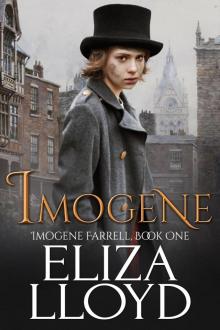- Home
- Eliza Lloyd
The Frenchman's Widow Page 4
The Frenchman's Widow Read online
Page 4
It was a strange juxtaposition: she didn’t give a damn about what anyone thought about her, but she gave a damn about Pierre and did everything within her ability to be respected and respectful. Which meant she had to give a damn about what people thought of her.
She wasn’t going to throw that away.
Jack might be willing to shag her in the nearest alleyway. He might be willing to break his marriage vows, and perhaps he had.
But he could do none of that if she said no. Reaching for him would have been some affirmation she wanted more.
“Jack, what we had was the past and I will always appreciate what you did for me. And for Frank. But I’ve changed. I’m no highborn lady, but I’m not the girl you met at Twenty Acres.”
“Charlie always said you would do what you wanted.”
“I’m doing what’s best for both of us. We can be acquaintances. Nothing more.”
He let out a great heave of breath. “So where is it we are going?”
“Nowhere.”
“I meant where am I to deliver you? Fitzroy Square? King’s College?”
“Brown’s Hotel. My lady’s maid went ahead with my luggage.”
“Well, at least you are not being completely senseless.”
“Is that what you think of me, Jack? Will you not see me as anyone but that girl?”
“She is the girl I know.”
He clicked his tongue and pulled at the rein. The horse obediently turned left.
“When did your husband die?” he finally asked.
“Over two months ago.”
“You aren’t wearing mourning garb.”
“I mourn,” she said. Sharing a bit about Pierre seemed harmless now. She bit her lip at the end of the soliloquy, thinking she’d shared too much. But she wanted to tell Jack more.
“Did you love him?”
“Do you love Catherine?”
“I did not marry for love.”
“So she was just another business arrangement?” When Jack said nothing, she went on, “Yes, I did love him. He treated me like a queen.” And she did her best to treat him like a king. Jack may have won her heart, but Pierre had won her trust and respect. “He was businessman, a wine merchant. We would walk along the Seine in the spring, attend the opera in the winter, and every summer we traveled to the south of France to the sea. He didn’t make me something I wasn’t. He taught me how to be a better me, which is why I don’t wear corsets at home.”
Jack laughed a little. The clip of the cabriolet and the gentle rush of the wind caused the ribbons of her bonnet to flitter around. Jack’s hat sat at a jaunty angle, his gaze mostly forward, but he glanced at her by turns.
“How did he die?”
“Old age.”
“Hmm.”
“Pierre was the man I needed. As Charlie would say—”
“Love is blind.”
“He’s never said that!”
“No? I have heard it somewhere, I think. My mother-in-law, perhaps.”
Imogene couldn’t laugh. There was something in his voice. A wistful yearning for what could not be. It was in her heart too.
“And you, Jack? Are you happy? Your sons must be a joy.”
“They are my life. My oldest son, Benjamin, has recently started riding with me. Nearly every morning.”
“And how old is he? Four?”
“A little older. Catherine was pregnant when we returned from our honeymoon. The other, Justin, is two.”
“Perhaps you will have a daughter with this next birth. And do you still do business on the docks?”
“Not as I used to. The earldom keeps me busy. It’s more about duty than fun. Then I only had to take care of myself. Now I am responsible for the population of a small village and many distant relatives.”
“You should do what I do. Pull out a deck of cards once in a while, select a fine bottle of wine and invite your monied friends over. At the end of the night, their pockets are empty, the bottle is dry and my heart is full.”
“I’ll keep that in mind.”
She could see the hotel ahead and they both grew quiet. If they were to be only acquaintances, seeing him once a year would be plenty. Such a meeting was the most she could bear.
“You have changed.” Jack gripped her gloved hand and kissed the back of it, holding her hand until he wheeled to a stop at the front of the bustling hotel.
He jumped down and hurried around. Imogene waited for him. Her instincts weren’t tamed, they were controlled. She wished for some privacy, but the hotel was busy as porters hurried around, guests disembarked from carriages and hackneys, and there she sat, watching as Jack reached for her, hands about her waist.
It was a dream-like moment, being born in the air and then standing next to Jack, staring up at him.
“I have so much I want to tell you,” he said.
They were face to face with very little space between. Energy sparked like lightning in the sky. What could she say? The truth and make an irreversible error? Or the non-lie?
“I’m sorry. It was necessary.” She glanced behind her. “I didn’t want to be a whore, but since I had to be, I’m glad it was you.”
“There are things I would have done differently.”
“Not me.” She was tempted to brush a kiss to his cheek. To his lips. “Au revoir, Jack.”
Until we meet again.
Chapter Three
The next day, Imogene fretted about meeting her brother again. Would she recognize Charlie? He wasn’t a boy any longer, and the last time Charlie had seen her she’d been dressed in the hoydenish garb of their street days.
Thinking about it still broke her heart. Hadn’t she promised to take care of him?
She had knelt in front of him as he sat on the back step of Lord Bancroft’s house.
He’d clutched her fingers, the awfulness of her last day reverberating through her body and into his little hand. Maybe he had sensed what had happened. Maybe he perceived she was about to abandon him.
He had cried and begged her not to leave him. They’d hugged—it had been as hard as leaving Jack. Mrs. FitzPatrick had come to love Charlie as her own and it was the only way Imogene had been able to leave him behind, knowing he was cared for.
She couldn’t have known Danny would leave soon after. She couldn’t have known how long she would be gone.
“I’ll be back,” she’d told him. She’d promised him. Only she hadn’t come back—she’d found a safe and happy life with Pierre. But both Charlie and Danny had found a foothold, away from the streets and the poorhouse. Perhaps it was providence, balancing the scales after Frank was transported.
Imogene stood beneath the stand of trees near the entrance steps, wearing a plain, comfortable muslin dress with wide stripes of brown, blue and white. There was a matching blue ribbon about her waist with a bow that tied in front, but that was all the adornment she allowed. The bonnet ribbons tickled her skin. She glanced at the skirting, puffed out with the support of only one petticoat. She clucked her tongue. Sometimes she didn’t recognize herself.
Imogene toed away a small stick rather than fret about her clothing or feel guilt about seeing dear Charlie.
“Imo?”
She glanced up. “Oh, Charlie. I am so sorry,” she said, and rushed into his open arms. She pulled away, feeling the tears well, only to look up at his serene face, the boy reflected in the young man.
“Sorry for what?”
“I should have come back sooner. I should have been there.”
She hugged him again, his strong arms draped over her shoulders, and he pulled her to his chest.
“I would kiss you if it weren’t for this infernal bonnet.” He tapped the edge. “How have you been, Madame LeClerc?”
“Oh, Charlie. Look at you!”
He gripped the lapel of his jacket and took a proper stance. “A gentleman and a scholar?”
“Bloody hell, Charlie, you look like a damn saint.” Oh, he was so tall and too thin. He was ther
e, the boy she knew and loved.
“And I was worried you had changed,” he said.
“Not on the life of my grandmother, if I knew who the dear woman was.” She hugged him again. “I’m so proud of you.”
Charlie took her hand and wrapped their arms together. “Let’s walk along the bank. I’ve been so busy this term; I haven’t had a chance to enjoy my usual strolls.”
Imogene stepped beside him as they walked, until she spied a bench. “Let’s sit for a minute. I just want to look at you.”
He laughed. The few freckles he had were now spread along his cheeks. His hair had gotten darker.
“I’m glad you came.” He leaned against the rock balustrade.
They talked quietly about his life, his endowment, Mary and Danny. None of it was completely new, only that they were saying it face to face for the first time in years. Change had been reflected in their letters—subtle, amazing and daunting—and so miraculous when one considered the hopelessness of their lives five years ago.
Charlie mentioned Frank, in the same wistful way Imogene did when she wanted to talk about him.
“Lud. Frank. He’s probably running a gambling house,” Charlie said, laughter in his voice.
“Maybe he’s the governor of Australia,” she answered, enjoying the thought of their irrepressible, obstinate and slightly dangerous brother enduring and succeeding.
If only he were alive. If only they knew.
“And what have you decided to do about Brighton?” he asked. “I would be so glad to have you home. To see you a few times a year. You are my family, Imogene.”
“You have Mary and Danny too.”
“It just seemed when you left, that was the end of the Farrells as a family. And you don’t know how it broke my heart.”
“I didn’t want to leave.” Imogene teared up. Charlie’s hand held hers tight. How she loved her brothers. “Especially you. I knew you needed us.”
“We needed each other. What happened?”
What happened? Would she ever tell Charlie the truth? As much as she could, she wanted to preserve his innocence.
“Do you remember the deep correspondence we had a few year ago?” she asked.
“The philosophical one about absolution and mercy? And I thought you were only encouraging discussion for one of my classes.”
“When we endure hard things, we are provided a way to overcome them,” she said.
“And your way to overcome Jack Davenport was to leave London? Are you going to see him while you are here?”
“Let’s not discuss Jack.”
“Why not? We’ll talk about him eventually.”
“Seems nearly impossible to keep a secret here.” It would do no good to frown at Charlie. He understood so much, even those things Imogene couldn’t articulate.
They proceeded down the walkway and passed several students along the way. Charlie was not embarrassed to introduce her, the respectable Madame LeClerc, his sister from Paris.
“You asked about Brighton. I have found a home. It’s not on the sea, but only a minute or two to walk there. Sunset from the balcony is amazing, though the agent said it wasn’t such a good idea to stand up there until it is repaired. You’ll love it, I’m sure.”
“Did you bring your girls?”
“Three of them. Ynez and Madelina are in Brighton, Laraine is here. Pierre was right. It does give me purpose.”
“As we are all meant to have.”
“I want you to visit soon. I could use the assistance of a strong young man to help rehabilitate the home. Ynez and Madelina are busy cleaning, and when I return I intend to hire laborers to repair the roof and chimney. You can swing a hammer, can’t you?” She was a little breathless. There were things Charlie didn’t know and that she hadn’t revealed in her letters.
Things he would find out, once he visited.
“Don’t forget the balcony. I was hoping to enjoy a week or two near the water, but if helping my sister means I get to spend time with her, then of course I will be there.”
“And when I’m settled, I intend to travel to Deal to see Danny.”
He stopped in the middle of the sidewalk. “I will make the time to travel with you.” Then he drew a deep breath. “And so things are changing again.”
“For the better, I hope,” she said.
“I think that depends on one’s definition of better.”
“What do you mean, Charlie? And don’t be taking the long way in telling me.”
“Lord Prescott will be at my ordination ceremony.”
“Oh.” She turned away. Was Jack coming because he knew she was in London? “Then I should also tell you I’ve seen the blighter, as smug and pompous as he ever was.”
Charlie smiled—his beneficent smile. Angels answered his prayers because of that smile. “We both know he is neither smug nor pompous.”
“How would you know?”
“Did you never wonder how things for the Farrells turned out so well?”
“Because you prayed and God answered. ‘Sides, He owed us for all the bad things He let happen.”
“He sent us Jack Davenport.”
“Jack? I was his whore,” she said on a high note. “That didn’t turn out so well for me.”
“Did it not? I would have guessed you of all people had Jack Davenport on a pedestal.”
“Why are we talking about him? If you have something to say, say it.”
“All right. But you promise you won’t allow your temper to get the better of you.”
“Temper? I don’t have a temper. And how would you know? I’ve been a model citizen the past five years.” Maybe this new Charlie was too smart for his own good.
“So temper might be the wrong word. Let me just say you have unique passions. You look fine and beautiful now, Imo, but underneath you are just like me.”
“Peter, Paul and Mary! What’s that got to do with Jack?”
“Lord Prescott is the reason we have all succeeded. I know I should have told you sooner. Jack should have told you himself. Granted, he does have a reason for not seeing you in person. And well, I was a young boy and it didn’t really become clear to me until I started King’s College.”
“That what? You’re saying Jack helped you?”
“I’m saying Jack has nearly been a father to me. He was the one who arranged for me to attend Harrow. He paid for my tuition and board at King’s College. It was his estate where I was to be a curate.”
“But you were to be a curate in Deal? Near Danny?”
“Yes, Danny has worked for Jack since he left London.”
Just as she’d requested Charlie say nothing about her life, she’d also never asked about Jack, except what she read in English newspapers that frequented Pierre’s table. The Earl of Prescott was mentioned now and again. She felt ashamed that she ate up those tidbits with the greed of a starving woman. She should have guessed; maybe deep down she knew their luck hadn’t changed on its own. That they’d had a helping hand after all—Jack Davenport.
She said nothing, instead leaning against the rock balustrade, staring out over the Thames. Had she pretended ignorance? Had she closed her eyes because Jack was married and would never be able to help her?
“You are angry,” Charlie said.
“No.” She was not angry...merely confused. “It was just his way of getting me to do what he wanted. To be his whore, his mistress, whatever fancy term you want to call it. I’m glad I stayed in Paris.”
“Everything he did, he did because he loved you.”
“No, he didn’t. He had Catherine.” She glanced over her shoulder. “So why are you telling me this now?”
“Because you’re coming home. Because I think you will be in London more often than you want to admit. Because I think Jack still loves you and you have to be the one to show some intelligence. He’s married. He’s not yours—no matter how you feel about him.”
“I wouldn’t bed a married man!” she exclaimed.
“No? But you could unknowingly drive a wedge between husband and wife. And you know better than I the temptation he poses to you.”
“Jack should have sent you to a broom factory instead of seminary.”
“Lord Prescott has been our friend from the beginning. Please respect his position, for all of our sakes.”
“Did Jack want you to keep it a secret from me?”
“Yes, just as you had secrets you wanted kept from Jack.”
* * * * *
Oh, she was opening a Pandora’s box by coming home. She’d barely slept last night, her stomach was in knots and her thoughts ran wild.
Charlie couldn’t know. Surely, he couldn’t know. Maybe he suspected. Or maybe he was referring to her request that Jack not be told where she was or what she was doing. That was secret enough.
She wrote at a small desk in her quaint room at Brown’s Hotel. She could read better than she wrote, which wasn’t saying a whole lot. Even though the letters were beautiful, it was a slow process to put her thoughts onto paper, but she must get this missive off to Brighton before she went out.
When the hackney arrived, Imogene gave him instructions, deciding at the last minute to view her old haunts before they began their search for materials, ribbons, shoes and other whatnots. Shopping did not come naturally to her either. To spend more than a few pence on any one item went against her stark upbringing.
And as hard as Pierre had tried to advise her in financial decisions, she still had trouble parting with money because one never knew where the next penny would come from.
Laraine was her second lady’s maid—more of a companion and teacher than a modiste or hairdresser—though Imogene did need assistance with regard to fashion. It was convenient to have Laraine finish the tiny buttons up the back of some of her dresses and to brush her shoes. And to make sure the color of her dresses matched her shoes or her reticule or her bonnet. Bother! How she missed the days of one pair of shoes and one dress.
“London is so exciting, oui?” Laraine said as they set off.
“I suppose so,” Imogene said with an air of distraction.
They wheeled around Hyde Park, slowed near Vauxhall and nearly stopped in the middle of London Bridge because the carriage traffic was so heavy. She could have jumped out, ran to the railing and spit into the Thames. The hackney driver had frowned at the mention of Twenty Acres, but Imogene had to go. And she was paying the man.

 An Inadvisable Wager (The Curse of the Weatherby Ball Book 2)
An Inadvisable Wager (The Curse of the Weatherby Ball Book 2) Love Me Once (The Infamous Forresters Book 3)
Love Me Once (The Infamous Forresters Book 3) Imogene
Imogene The Frenchman's Widow
The Frenchman's Widow Jack's Hellion
Jack's Hellion Another Lover
Another Lover A Mistress To Remember (Birds of Paradise Book 3)
A Mistress To Remember (Birds of Paradise Book 3)